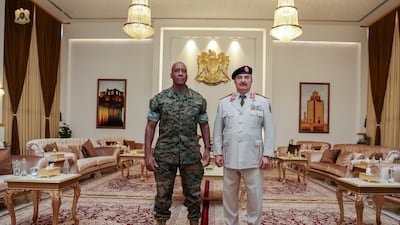The commander of US forces in Africa and the head of the US embassy in Libya have met Libyan military commander Field Marshal Khalifa Haftar in the eastern city of Benghazi, amid a standoff between the country's rival power centres that has shut down oil production.
The US embassy said Gen Michael Langley and charge d'affaires Jeremy Berndt “highlighted the importance of preserving Libya’s stability and of de-escalation in the context of current tensions” during their meeting on Tuesday with Mr Haftar, whose Libyan National Army controls the country's east and south.
Their meeting focused on the commitment of the US to strengthening its partnership with Libyans from all parts of the country and supporting Libyan efforts to protect the country's sovereignty amid regional security challenges, the embassy said in a post on X.
“The United States urges all Libyan stakeholders to engage constructively in dialogue” with support from the UN Support Mission in Libya and the international community, added the embassy.
Libya has been grappling with a complex political landscape since the overthrow of Muammar Qaddafi in 2011, with control divided between two rival governments. The internationally recognised Government of National Unity is located in Tripoli, while the Government of National Stability, which is backed by Mr Haftar, is based in the east.
Authorities in the east – where most of Libya's oilfields lie – declared on Monday that all oil production and exports, the country's main source of revenue, would be halted. The move followed a decision by Tripoli-based authorities to sack the head of the central bank.
Since the fall of Qaddafi, numerous armed groups have emerged in Libya. Militias have consolidated power through leaders who have acquired top government and military posts, blurring the lines between militias and state forces.
Observers say this has diminished prospects for disarmament and reintegration into a unified army under state control.
According to a report by the US Congressional Research Service, Washington has a complicated relationship with Mr Haftar and the LNA.
While the US has recognised the GNU as the legitimate government of Libya, it has also worked with Mr Haftar in counterterrorism efforts against ISIS and Al Qaeda affiliates in the country.
Mr Haftar's recent moves have further complicated the political landscape. On August 12, the GNU strongly condemned Egypt's decision to receive Osama Hamad, the head of the GNS, for an official visit.
Mr Hamad was accompanied by Mr Haftar’s son, Balqasim, who is the director general of the Libyan Development and Reconstruction Fund.
Prior to their visit to Egypt, Mr Hamad and Balqasim Haftar were hosted for talks in Turkey in July.
Ankara, previously a supporter of the UN-backed GNU, has recently shifted its position on Libya and is now engaging the rival GNS in diplomacy.
The GNU said it views these engagements by Egypt and Turkey as an escalation and a departure from the international community's previously unified position on Libya.
It has not commented publicly on visit to Benghazi by Gen Langley and Mr Berndt.
Prime Minister Abdul Hamid Dbeibeh recently formed a security committee to address the proliferation of armed groups in Tripoli and limit security operations to Ministry of Interior personnel.


